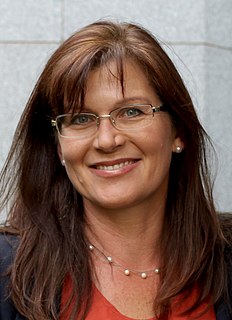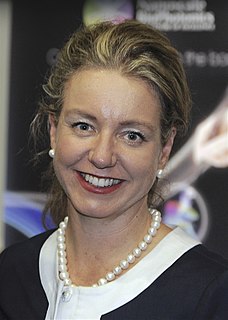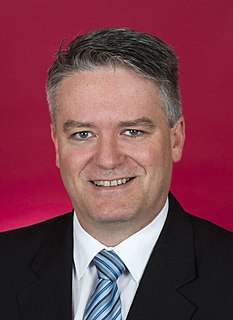
Luke Hartsuyker is a former Australian politician who was a member of the House of Representatives from 2001 to 2019, representing the Division of Cowper in New South Wales for the National Party. He served as a government minister in the Turnbull Government and an assistant minister in the Abbott Government. In August 2018, he announced he would retire from parliament at the 2019 federal election.

Kate Alexandra Lundy is a former Labor Party member of the Australian Senate, representing the Australian Capital Territory. Lundy served as the Minister for Multicultural Affairs and the Minister Assisting for the Digital Economy in the Second Rudd Ministry; having previously served as the Minister for Sport and the Minister Assisting the Minister for Industry and Innovation.

The Minister for Defence is the principal minister responsible for the organisation, implementation, and formulation of government policy in defence and military matters for the Australian Government. The individual who holds this office directs the governments approach to such matters through the Australian Defence Organisation and, by extension, the Department of Defence and the Australian Defence Force. The office of the Minister for Defence, like all Cabinet positions, is not referenced in the Constitution of Australia but rather exists through convention and the right of the Governor-General to appoint ministers of state.
Nick Bolkus is a former Australian Labor Party politician. He was a member of the Senate from July 1981 to 2005, representing the state of South Australia.
The First Howard Ministry was the 61st ministry of the Government of Australia, and was led by Prime Minister John Howard. It succeeded the Second Keating Ministry upon its swearing in by Governor-General Sir William Deane on 11 March 1996 after the 1996 election, and was replaced by the Second Howard Ministry on 21 October 1998 following the 1998 election.

Reginald Greive Withers was a long-serving member of the Australian Senate, a government minister, and Lord Mayor of Perth.
Christopher Vaughan Evans is a former Australian politician. He was a member of the Australian Senate for the state of Western Australia from 1993 to 2013, representing the Australian Labor Party.

Helen Beatrice Polley, an Australian politician, has been an Australian Labor Party member of the Australian Senate, representing the state of Tasmania since 1 July 2005.

The Minister for Infrastructure, Transport and Regional Development in the Government of Australia is Michael McCormack, serving since 26 February 2018. McCormack is the leader of the National Party and Deputy Prime Minister of Australia.

The Minister for Women in the Government of Australia is Marise Payne since May 2019, who is a member of the Second Morrison Ministry. Ministers holding the position, first introduced in 1976 during the Second Fraser Ministry, have held several different titles. They have often held other portfolios, and sometimes sat in Cabinet of Australia. Almost all office holders have been women.

Stephen Patrick Jones is an Australian politician who represents the Division of Whitlam for the Australian Labor Party. He was elected at the 2010 Australian federal election and is the current Shadow Assistant Treasurer and the Shadow Minister for Financial Services.

Bridget McKenzie is an Australian politician. She was elected to federal parliament in 2010 and took her seat as a Senator for Victoria on 1 July 2011. She won re-election at the 2016 election. In December 2017, she was elected deputy leader of the National Party in place of Fiona Nash, who had been ruled ineligible for election to the Senate by the High Court. As a consequence of the terms of the Coalition agreement with the Liberal Party, Prime Minister Malcolm Turnbull immediately appointed McKenzie to cabinet as Minister for Sport, Minister for Rural Health, and Minister for Regional Communications. When Scott Morrison replaced Turnbull as Prime Minister, he reshuffled the ministry and abolished the latter two positions. McKenzie retained the sports portfolio and also became Minister for Regional Services, Decentralisation and Local Government until the 2019 Federal election, after which she became the first woman to be appointed as Minister for Agriculture.

Robin Donald Chalmers was an independent Australian political journalist and commentator. The Canberra Press Gallery's longest serving member, from 1951 to 2011, his career spanned over 60 years reporting on the Parliament of Australia. Chiefly using the mediums of print and radio, his audience consisted mainly of other well-informed interested parties in the media, politics, industry and government, not a face often seen by the mainstream general public; he was, as described by the prime minister of Australia, Julia Gillard, "a journalist's journalist" . In the later half of Chalmers career, he was best known for his roles with the independent, economic and political, weekly newsletter Inside Canberra .

The Leader of the Government in the Senate is the most senior cabinet minister in the Australian Senate. The title is given to the leader of the governing party, irrespective of whether the government has a majority or even a plurality in the Senate. His or her Opposition counterpart is the Leader of the Opposition in the Senate.
The Leader of the Opposition in the Senate is a party office held by the Opposition's most senior member of the Shadow Cabinet in the Australian Senate, elected to lead the opposition party in the body. Though the leader in the Senate does not have the power of the office of Leader of the Opposition, there are some parallels between the latter's status in the lower house and the former's in the Senate. In addition to his or her own shadow ministerial portfolio, the leader has overarching responsibility for all policy areas and acts as the opposition's principal spokesperson in the upper house. The leader is entitled to sit at the table of the Senate, and has priority in gaining recognition from the President of the Senate to speak in debate. Another similarity is that the leader typically announces changes to opposition officeholders in the Senate, including shadow ministers, party leadership and whips. The leader also has some responsibility for appointing opposition senators to committees, a role filled by the Manager of Opposition Business and whips in the lower house. The current leader is Penny Wong. She is assisted by a Deputy Leader of the Opposition in the Senate, currently Kristina Keneally.
In the Parliament of Australia, the political parties appoint party whips to ensure party discipline, help manage legislative business and carry out a variety of other functions on behalf of the party leadership. The most important function of a government party whip is to ensure that a sufficient number of members and senators are present to take part in votes in the chamber, to maintain a parliamentary quorum and to prevent censure motions succeeding. Their roles in the chamber include taking divisions, and arranging pairs which affects the ability of members and senators to leave parliament during sittings, as well as the entitlement to be absent during divisions.
The Second Morrison Ministry is the 73rd ministry of the Australian Government. It is led by Prime Minister Scott Morrison. The Second Morrison Ministry succeeded the First Morrison Ministry following the 2019 Australian federal election. The ministry was announced on 26 May 2019 and was sworn in on 29 May.
Gerard Rennick is an Australian politician who has been a Senator for Queensland since July 2019. He is a member of the Liberal National Party of Queensland and sits with the Liberal Party in federal parliament.
The "sports rorts" affair, also called the McKenzie Scandal, is a scandal named for the many similarities it has to the sports rorts affair that occurred under the Keating Government in 1993-1994. In January 2020, the Australian National Audit Office published a report into Sport Australia's Community Sport Infrastructure Program titled 'Award of Funding under the Community Sport Infrastructure Program'. The report had two main conclusions: the award of grant funding was not informed by an appropriate assessment process and sound advice and the successful applications were not those that had been assessed as the most meritorious in terms of the published program guidelines. The outcomes of the report resulted in extensive media coverage due to Senator Bridget McKenzie, the then Minister for Sport in the Morrison Government, using her ministerial discretion to favour marginal or targeted electorates in the allocation of grants in the lead up to 2019 Australian federal election.
Marrickville Women's Refuge, also known as Jean's Place, was formally opened in April 1976. It was one of the earliest refuges to open in New South Wales as part of the original NSW Women's Refuge Movement in response to the need for specialised feminist housing and support services for women and children fleeing domestic violence, following that of Elsie Refuge and Bonnie Women's Refuge. Today, the refuge operates as a company limited by guarantee with the name Marrickville Women's Refuge Ltd, and is registered as a public benevolent institution. The refuge, whilst still known as Marrickville Women's Refuge, has been trading as the Aboriginal Women and Children's Crisis Service since 1 November 2014, after the implementation of the 'Going Home Staying Home' tendering program in New South Wales.











